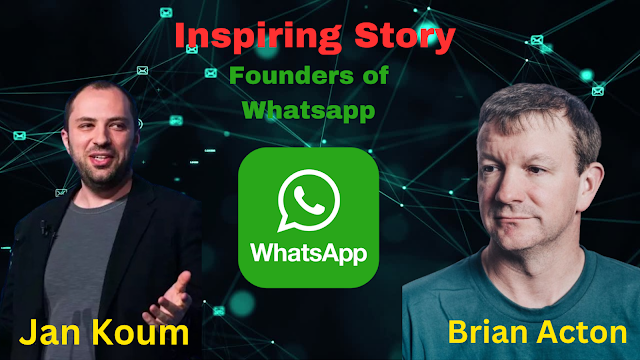The WhatsApp Journey: The Inspiring Story of Jan Koum and Brian Acton
In 2009, two former Yahoo employees, Jan Koum and Brian Acton, co-founded WhatsApp, a mobile messaging app that would soon revolutionize global communication (Feedough). Their journey, marked by determination, innovation, and success, is a testament to the power of pursuing one's passion and the potential of entrepreneurship.
Jan Koum: The Self-Made Billionaire
Born in Ukraine, Jan Koum moved to the United States with his family when he was 16. Before discovering his passion for computer programming, he worked various jobs, including cleaning grocery stores (Wikipedia). Koum's journey to WhatsApp began when he bought an iPhone in January 2009 and realized the potential of the app industry (Feedough).
Koum and Acton founded WhatsApp in 2009, and their app quickly gained popularity. In fact, it grew so fast that by 2010, it had already amassed 250,000 users (LinkedIn). The app's success can be attributed to its simplicity and focus on user experience, which set it apart from other messaging apps.
Brian Acton: The Tech Visionary
Brian Acton, a Stanford-educated programmer, met Koum while working for Yahoo! in 1997 (Britannica). His journey to WhatsApp was challenging. After leaving Yahoo!, Acton worked on various projects, including a failed startup, before he met Koum and became a co-founder of WhatsApp (Forbes).
The WhatsApp Journet: A Revolution in Communication
WhatsApp's journey from a small startup to a global phenomenon is a testament to its founders' vision and the app's innovative features. The app's simplicity and focus on user experience made it a hit among users worldwide (Feedough). By 2015, WhatsApp had become the world's most popular messaging application, with over 2 billion users (Wikipedia).
FAQs (Frequently Asked Questions)
Q: What inspired Jan Koum and Brian Acton to create WhatsApp? A: Jan Koum and Brian Acton were inspired to create WhatsApp as a response to the lack of privacy and security in existing messaging platforms. Their vision was to develop a simple, user-friendly app that prioritized user privacy and data protection.
Q: How did WhatsApp differentiate itself from other messaging apps? A: WhatsApp differentiated itself by focusing on simplicity, reliability, and user privacy. Unlike other messaging apps that were cluttered with ads and unnecessary features, WhatsApp offered a clean interface, encrypted messaging, and no ads, resonating with users worldwide.
Q: What challenges did Jan Koum and Brian Acton face during WhatsApp's early days? A: During WhatsApp's early days, Jan Koum and Brian Acton faced numerous challenges, including technical glitches, funding issues, and skepticism from investors. However, their determination and perseverance ultimately propelled them to success.
Q: How did WhatsApp's acquisition by Facebook impact its users? A: WhatsApp's acquisition by Facebook raised concerns among users regarding data privacy and security. However, WhatsApp reassured users that its commitment to user privacy remained unchanged, despite being owned by a larger corporation.
Q: What role did innovation play in WhatsApp's success? A: Innovation played a crucial role in WhatsApp's success, allowing the platform to continually evolve and adapt to changing user needs. Features such as end-to-end encryption, voice calling, and file sharing helped WhatsApp stay ahead of the competition and retain its user base.
Q: What is Jan Koum and Brian Acton's legacy in the tech industry? A: Jan Koum and Brian Acton's legacy in the tech industry is one of innovation, resilience, and integrity. Their vision for WhatsApp revolutionized the way people communicate globally, leaving an indelible mark on the digital landscape.
Conclusion
The journey of Jan Koum and Brian Acton from Yahoo employees to the co-founders of a global messaging app is a test-inspiring story of entrepreneurship. Their journey demonstrates that with determination, innovation, and a focus on user experience, anyone can revolutionize an industry and change the world.

Post a Comment